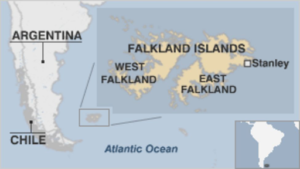In news– Recently, the UK objected to China backing Argentina’s claim to the Falkland Islands.
The dispute over Falkland Islands-
- Since the 18th century, the Falkland Islands have always been subjected to colonization and conquests by Britain, France, Spain and Argentina.
- Prior to the 1700s, the islands were uninhabited, with France first establishing a colony there in 1764.
- The next year, when the British arrived to claim the islands for themselves, it marked the start of a dispute that has been ongoing ever since.
- By 1811, colonial powers had left, with the islands largely being used and visited by sealing and whaling ships.
- But in November 1820, an American privateer David Jewett once again kick-started a fresh dispute by claiming possession of the islands on behalf of Argentina.
- Over a period of two decades, minor conflicts followed between Argentina and Britain, with both asserting dominance over the other, alternatively finding victory in the conflict.
- That ended in 1840, when the Falklands became a Crown colony and Britain sent Scottish settlers to officially establish a community, one that was largely pastoral.
- Strategically, the Falkland Islands were important to Britain as they were used by London as a military base in the South Atlantic Ocean, both during the First and Second World War.
- However, following the end of the Second World War, the islands once again became a cause of dispute between the United Kingdom and Argentina, with both asserting sovereignty over the islands.
About Falkland Islands-
- The Falkland Islands (Islas Malvinas) are an archipelago in the South Atlantic Ocean on the Patagonian Shelf.
- The name “Falkland Islands” comes from Falkland Sound, the strait that separates the two main islands.
- The name “Falkland” was applied to the channel by John Strong, captain of an English expedition that landed on the islands in 1690.
- Strong named the strait in honour of Anthony Cary, 5th Viscount of Falkland, the Treasurer of the Navy who sponsored his journey.
- The archipelago comprises East Falkland, West Falkland, and 776 smaller islands which are about 480 kilometers east of South America’s southern Patagonian coast.
- With rugged terrain and cliff-lined coats, they are home to sheep farms and abundant birdlife.
- As a British overseas territory, the Falklands have internal self-governance, and the United Kingdom takes responsibility for their defence and foreign affairs.
- Under the British Nationality (Falkland Islands) Act 1983, Falkland Islanders are British citizens.
- The capital, Stanley, sits on East Falkland, the largest island.
- The islands lie on the boundary of the subantarctic oceanic and tundra climate zones.

- Argentina has maintained that the Falklands were illegally taken from it in 1833 and invaded the British colony in 1982, it is called the Falklands War.
- Since it is the 40th anniversary of the war this year, Argentina has been single-mindedly engaging regionally and internationally, to assert its stance on the sovereignty of these islands and recent joint statement by Beijing and Buenos Aires is among the most prominent of these engagements.
















